Retailers challenge New Brunswick plan for electronics waste
Retailers are objecting to New Brunswick's proposed electronics recycling program that would force them to hide the recycling fee from the consumer in the cost of an item.
The Retail Council of Canada says the proposal "is misguided; will hide eco-fees from consumers while inflicting costs on businesses that are not seen anywhere in Canada."
"It is unfathomable that a government elected on a promise to increase transparency, would force businesses to hide fees from New Brunswick consumers," said Jim Cormier, the Atlantic director for the Retail Council of Canada.
New Brunswick is the last province to establish an electronics recycling program and hopes to have the program in operation by the fall of 2016.
Under the established recycling programs elsewhere, the industry runs the program and consumers are charged a fee to customers at the time of purchase to cover the cost of recycling the time when it reaches the end of its life.
The fees typically vary per time, with an online list from The Source indicating the recycling fee to be $2.25 for a desktop computer shipped to Nova Scotia or Prince Edward Island while the fee for a television that is 46-inches or larger is $35.
Retailers say New Brunswick's plan runs counter to a retailer's national or regional harmonized approach and forces retailers to advertise a different price in New Brunswick for in-store and online electronics purchases.
"This proposal will force retailers to develop separate flyers, a separate website and a separate point of sale system only for New Brunswick," said Cormier.
"It will also mean that the advertised price for a television in New Brunswick will be higher than the advertised price for the same television, from the same retailer in Nova Scotia."
The Retail Council says it has spent "several years" trying to inform the province that its proposal runs counter to the best practices in electronics recycling that have developed and harmonized across Canada.
"This proposal doesn't provide better environment outcomes than the model used in neighbouring provinces," said Cormier.
"It is bad for business in New Brunswick and leaves consumers wondering why they are paying more than their neighbours."
The CBC contacted Environment and Local Government Minister Brian Kenny for comment. In a statement issued from his office, Mr. Kenny said, "The goal is to ensure that New Brunswickers don't face unexpected costs when they go to pay for an item. Consumers expect to pay the advertised price for a product plus tax at the point of sale and we don't want any surprises at the cash register."
In addition, Mr. Kenny said although recycling costs must be included in product price, industry would be free to communicate those costs to the public. He indicated that New Brunswick already has integrated fees in its programs for paint and oil/glycol and those programs are working well. He also pointed out that Quebec integrates fees in their e-waste program.



